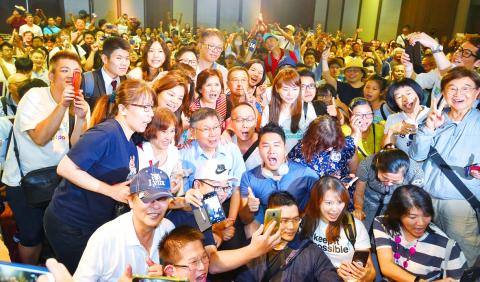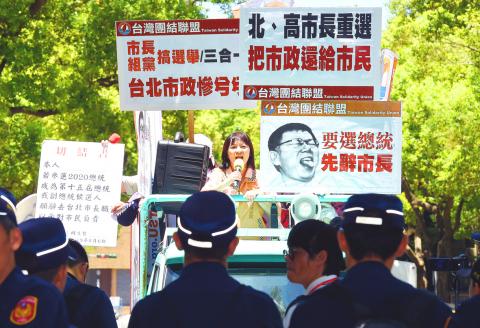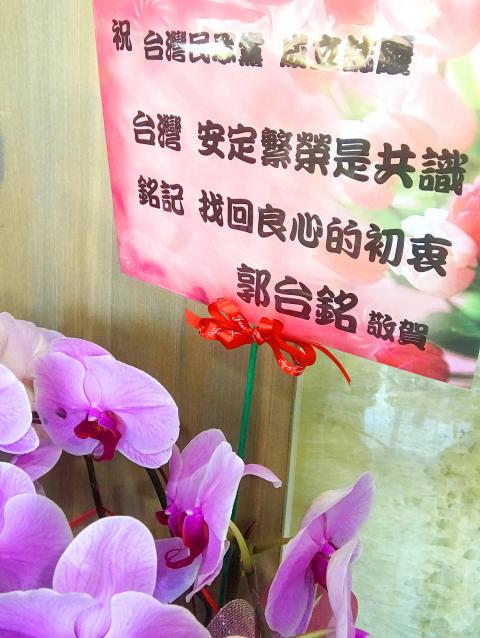The Taiwan People’s Party (台灣民眾黨, TPP) was formally established yesterday in Taipei, with the party announcing its constitution and the election of Taipei Mayor Ko Wen-je (柯文哲) as its chairman.
The founding ceremony was held at the National Taiwan University Hospital International Convention Center, with hundreds of people attending.
Ko arrived shortly past noon and was welcomed by enthusiastic chants of: “Taiwan’s choice — Ko Wen-je,” “The best choice — Ko Wen-je” and “The party members’ choice — Ko Wen-je” — similar to the slogans used during his mayoral re-election campaign last year.

Photo: Liu Hsin-de, Taipei Times
The party has 111 founding members, with 72 attending the morning meeting to decide the party’s constitution and elect a chairman, a cohost of the event said.
The founding members include members of the Ko administration — adviser Tsai Pi-ju (蔡壁如), Secretary-General Chang Jer-yang (張哲揚), spokesman Liu Yi-ting (劉奕霆) and deputy spokespeople Ke Yu-an (柯昱安) and Huang Ching-ying (黃?瑩) — and Taipei Rapid Transit Corp (台北捷運) chairman Lee Wen-tsung (李文宗).
Ko said that the TPP was founded to change Taiwan’s political culture, as the ideological battle between the two major parties has left the nation in a rut and led to friction over the past two decades.

Photo: Liao Chen-huei, Taipei Times
He said that his foremost principle is to promote the nation’s “general interests and the public’s maximum well-being.”
The biggest problem that Taiwanese politics has faced since 2000 is the destruction of the civil service system, because policies can be suddenly changed by political forces, without professional and technical discussions, unlike the past when there were technocrats, he said.
“While honesty and diligence should be basic requirements of government, they have become rare in today’s Taiwan,” he said, adding that the government needs to improve governance, regain the public’s trust and highlight the nation’s value to the world with a graft-free government.

Photo: CNA
Ko reiterated that he believes “Taiwanese values” are the implementation of universal values in Taiwan, including democracy, freedom, diversity, openness, rule of law, human rights, caring for the underprivileged and sustainable development.
“The TPP we established today is the coming together of ideas. We are not political leaders, but rather hope to become preachers of culture,” he said.
Public opinion, professional expertise and values are the three most important elements in decisionmaking, he added.
According to the party’s charter, the TPP conforms to the existing constitutional system and aims to strengthen national governance, enhance national interest and abolish corruption.
It will take a practical approach in foreign relations to ensure Taiwan’s survival and protect its sovereignty, it says.
Hon Hai Precision Industry Co (鴻海精密) founder Terry Gou (郭台銘) and Chinese Nationalist Party (KMT) Legislator Wang Jin-pyng (王金平) sent flowers to congratulate the party on its founding.
Gou’s gift came with a card that says: “Remember the reason it all started. It is our shared goal to ensure Taiwan’s stability and prosperity.”
Wang’s gift came with a message calling for solidarity to ensure peace and stability for Taiwan.
Gou’s and Wang’s gifts were the only flower baskets placed at the entrance of the venue.
Yonglin Education Foundation chief executive officer Amanda Liu (劉宥彤), a member of Gou’s campaign team, said she attended the event in her personal capacity to offer the party her best wishes.
The event coincided with Ko’s 60th birthday, and the mayor’s parents attended the event, where supporters shouted “Happy birthday” to Ko.
Outside the venue, several members of pro-independence groups and self-styled “Ko haters” staged a rally and called on Ko to resign as mayor if he runs for next year’s presidential election.
Additional reporting by Ann Maxon

DAREDEVIL: Honnold said it had always been a dream of his to climb Taipei 101, while a Netflix producer said the skyscraper was ‘a real icon of this country’ US climber Alex Honnold yesterday took on Taiwan’s tallest building, becoming the first person to scale Taipei 101 without a rope, harness or safety net. Hundreds of spectators gathered at the base of the 101-story skyscraper to watch Honnold, 40, embark on his daredevil feat, which was also broadcast live on Netflix. Dressed in a red T-shirt and yellow custom-made climbing shoes, Honnold swiftly moved up the southeast face of the glass and steel building. At one point, he stepped onto a platform midway up to wave down at fans and onlookers who were taking photos. People watching from inside

A Vietnamese migrant worker yesterday won NT$12 million (US$379,627) on a Lunar New Year scratch card in Kaohsiung as part of Taiwan Lottery Co’s (台灣彩券) “NT$12 Million Grand Fortune” (1200萬大吉利) game. The man was the first top-prize winner of the new game launched on Jan. 6 to mark the Lunar New Year. Three Vietnamese migrant workers visited a Taiwan Lottery shop on Xinyue Street in Kaohsiung’s Gangshan District (崗山), a store representative said. The player bought multiple tickets and, after winning nothing, held the final lottery ticket in one hand and rubbed the store’s statue of the Maitreya Buddha’s belly with the other,

‘NATO-PLUS’: ‘Our strategic partners in the Indo-Pacific are facing increasing aggression by the Chinese Communist Party,’ US Representative Rob Wittman said The US House of Representatives on Monday released its version of the Consolidated Appropriations Act, which includes US$1.15 billion to support security cooperation with Taiwan. The omnibus act, covering US$1.2 trillion of spending, allocates US$1 billion for the Taiwan Security Cooperation Initiative, as well as US$150 million for the replacement of defense articles and reimbursement of defense services provided to Taiwan. The fund allocations were based on the US National Defense Authorization Act for fiscal 2026 that was passed by the US Congress last month and authorized up to US$1 billion to the US Defense Security Cooperation Agency in support of the

‘COMMITTED TO DETERRENCE’: Washington would stand by its allies, but it can only help as much as countries help themselves, Raymond Greene said The US is committed to deterrence in the first island chain, but it should not bear the burden alone, as “freedom is not free,” American Institute in Taiwan Director Raymond Greene said in a speech at the Institute for National Defense and Security Research’s “Strengthening Resilience: Defense as the Engine of Development” seminar in Taipei yesterday. In the speech, titled “Investing Together and a Secure and Prosperous Future,” Greene highlighted the contributions of US President Donald Trump’s administration to Taiwan’s defense efforts, including the establishment of supply chains for drones and autonomous systems, offers of security assistance and the expansion of